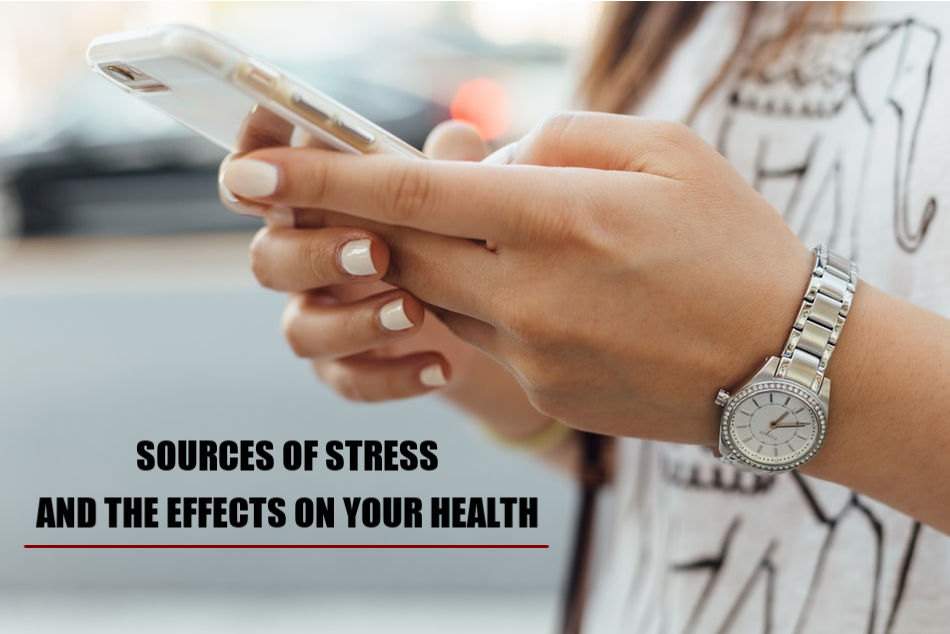Stress is normal and something everyone experiences, but that doesn’t mean that you should take it lightly. It is a serious situation.
There are many sources of stress and your entire mind and body can take a beating from it. It can really take a toll on you and can have damaging effects on your overall health.
Stress disguises itself in so many different forms. When it comes knocking at your door, it starts affecting your mental health and clarity and to a large extent your entire well being.
It will start to manifest itself by having physical effects on your body. For starters, it will give you headaches and issues with your digestive system.
The crux of the matter is, you shouldn’t let complacency take over in these situations. You should always take your stress seriously and treat it just like you would any other health condition that you have.
In order to find the right treatment, you need to figure out where your stress comes from. You might find some surprising causes of stress in your life that you hadn’t even thought of before.
Not Taking Care Of Yourself Enough

If you are not taking care of yourself, you might notice that you have much higher levels of stress. This is exactly why self-care is so important.
You, should always be your highest priority. It is not a matter of being selfish at all or trying to isolate yourself in your home, but doing things for you should be the most important thing you do.
It goes without saying, You need to take care of your health. Whether it’s your hygiene, happiness, or mental health. They are all equally important to keeping excess stress away.
You Don’t Pay Attention to Proper Nutrition

A big part of taking care of yourself and reducing your stress is making sure that you eat nutritious foods.
This doesn’t mean that you have to be on a strict or a crash diet. Instead, it just means that you should make sure that you’re providing your body and mind with adequate nutrition.
Don’t feel left out in the cold if you do have food allergies or food sensitivities. Swap out a particular food to other substitutes that you can tolerate that at the same time provide maximum health and nutrition benefits.
If you can eat pretty much anything, look for a balance of fruits and vegetables, healthy fats, lean protein, whole grains, and don’t forget the nuts and legumes.
These will allow you to get all the important vitamins and minerals you need, which can also help you to keep stress at bay.
Relationship Issues-Even When They Aren’t Obvious

You probably haven’t thought about it and might not even realise that yes – your personal relationships and friendships could be causing you stress.
There are some obvious issues with relationships that you probably know cause stress but there might be others you haven’t considered.
For example, if you have a close friend in your life who is always negative and toxic, and does nothing but complain about their life. Then they are just spreading that negativity around.
While in the short-term, it doesn’t seem to cause stress, it might be bringing you down and leading to emotional stress in the process.
Mind you, there is nothing wrong with listening and giving advice or helping a friend in need. At the same time, that should not be the situation day in and day out.
If you feel a lot of stress in your life, take a look at your personal relationships. Give some thought to who you spend the most time with, and how they might be impacting you.
Daily Annoyances That Add Up

Everyone has those annoying or frustrating things that seem to happen every single day. Maybe you are always kept late at work. Or it could be that your children are always running late for school. It could even be a case that your water heater keeps going out.
None of these are life-altering situations. Having said that, however, over time they do add up and really start to grate on your nerves and get to you.
A great way to tackle these set of circumstances is to start writing in a journal about what is bothering you each day. In that way, you can definitely figure out resolutions that will help keep the added stress away.
Social Media

The fact of the matter is that Social media can be your best friend or your worst enemy, and more often than not, both at the same time.
Social media does have its benefits, such as helping you to stay in contact with long-distance family and keep connected with friends and co-workers. Unfortunately, it can also be detrimental to your mental health.
You might have added stress each day just by using Facebook, Twitter, and Instagram without even realizing it.
If you can’t figure out where all your stress is coming from, try unplugging from social media for a week and see how you feel.
Being Messy and Disorganized

If you are a messy person, it might not seem like a big deal, but you might be surprised to know that this can add stress to your life.
When you are constantly looking for your keys or you can’t figure out which pile of clothes is clean or dirty. If you always have to search for paperwork on your desk, all of these are situations that are adding to the amount of stress you have.
Not only this, but just waking up in a bedroom that is messy and disorganized can make your stress and overwhelm worse.
It is worth taking a few minutes every day to clean your living and workspaces in order to keep things as neat as possible and your sanity intact.
You don’t need things to be perfect, but a little more organization can be good for you and keep stress at arms length.
The Effects Of Stress On Your Health

Your body reacts to high levels of demands and worries by giving you stress.
This, as you know, can affect you mentally or physically, or both. Most people with a lot of stress tend to get used to it, but that doesn’t make it normal.
You can live your life without all this added stress as many of the sources of stress and overwhelm are entirely unnecessary.
Before you look at ways to reduce stress, it is a good idea to understand WHY you need to reduce it.
Here are some of the different ways stress can affect you mentally and physically.
Increases Your Depression

One of the links between stress and your mental health is that it increases the feelings of depression.
Stress doesn’t cause depression if you don’t already suffer from it, but it can make it worse over time.
One reason for this is because the stress hormones may create a type of sedative effect.
This can lead to common depression side effects like fatigue, lethargy, lack of motivation, poor productivity, sleeping more, and having no interest in activities you used to enjoy.
Stress in itself can be a big trigger if you suffer from clinical depression.
When you experience that rise in stress hormones, it can lead to you having depressive episodes. These occurrences then cause more stress and turn into more depression or anxiety.
The only way out of this cycle is to treat both the depression and the stress, and understand where each one is coming from.
Makes Your Anxiety Worse

If you have an anxiety disorder like generalized anxiety disorder, PTSD, or panic disorder, you are already susceptible to anxiety itself.
The problem is that many things can easily trigger your anxiety and panic episodes, including high amounts of stress.
Just like with depression, increased stress hormones are a very common trigger for anxiety.
You might even find that you are having trouble distinguishing between your stress and anxiety because they continue occurring at the same time. Each one can make each of them worse, just like with depression.
In this case, reducing your stress should help you to reduce your anxiety at the same time.
If you think you are struggling with both, try working on stress relief methods first and see if it helps with your anxiety.
It Can Cause Personality and Behavioral Changes

In addition to making your mental health disorders worse, there are also other mental and emotional health changes that can occur when you deal with high amounts of stress.
You might notice that when you have a lot of stress, you don’t deal with unexpected changes very well.
This is your mind’s reaction to the increased stress hormones you are already experiencing. You can become agitated and irritable much more easily. You also have far less patience than you usually have.
Some other personality and behavioral changes that are common with people with stress include:
- Frustration
- Hostility
- Overthinking
- Anger
- Being more suspicious
- Bitterness
- Lack of motivation
In turn, this can cause you to be more isolated, lose interest in activities, and have issues focusing and concentrating on work.
There are Physical Effects of Stress

As you probably know, if you have ever dealt with stress, there are also many physical signs and side effects.
It might start with chronic physical pain like headaches, muscle tension, neck or back pain, and chest pain.
It can then morph into other physical symptoms. These include issues like fatigue, trouble sleeping, digestive issues and stomach cramping, fatigue, a decrease in your sex drive, skin changes, and hair loss.
The problem with physical signs of stress is that they are often similar to symptoms you experience from many other physical or emotional conditions.
This can sometimes make it difficult for your doctor to diagnose the problem.
Typically what happens is that if you are suffering from one of these symptoms, your doctor will first rule out other causes. Then if nothing is found, assume that it is from stress.
Conclusion
Either way, don’t take it for granted. Stress is not something you should ignore or push to the side. It affects your mind and body in countless ways.
That being said, stress should be considered to be just as serious as any other medical condition you might have. As a result, it is sensible that you manage any type of stress early in the game to prevent any harmful effects on your mental and physical health.
What are some of the things that cause you to stress and what are some effects it has on your body and overall health?
























These are all great points! Sometimes we don’t even realize what is causing our stress. As someone with anxiety, I have to pay close attention to these factors. Thank you for shedding light on this!
Hi Anna,
These little things really sneak up on us before we can wrap our minds around them. Glad you found these points useful!
What a comprehensive post!! Sometimes we forget that stress can build up from so many things- even small incidents. Thanks for reminding us to take care of ourselves.
Hey Lisa,
It’s those little things that spiral into big things. We are our #1 priority. We have to take care of ourselves first before we can take care of anyone or anything else.